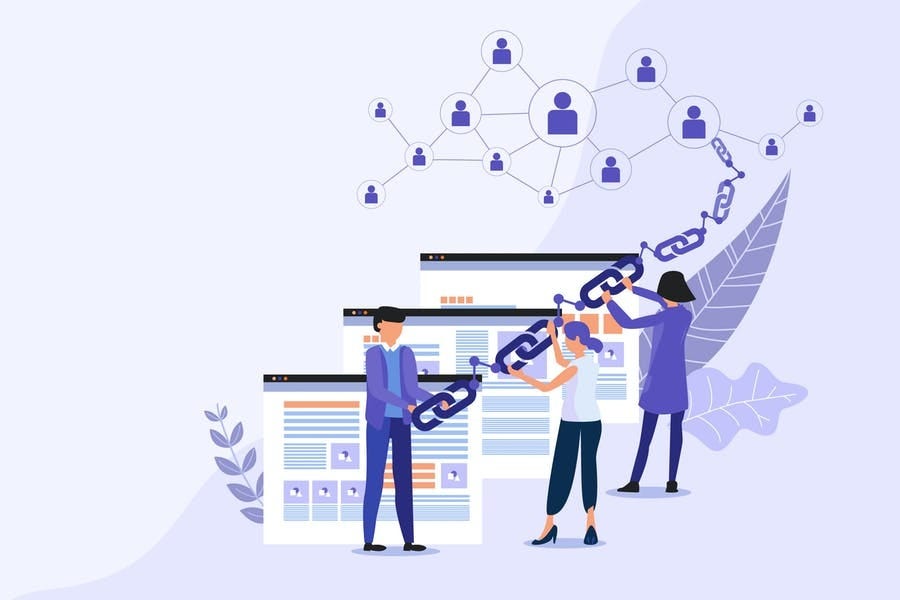What’s one of the first things that needs to be done after launching a well-designed e-commerce store? Building authority around it and gaining visibility.
There is nothing that Google loves more than authoritative and thrust-worthy content, and it’s clearly emphasized in the guidlines. Now, how do you show that what you say has value? The answer to this question is by building links to your page.
Link-building is when other websites link to yours; this creates a word-of-mouth chain that shows search engines that your page has credibility. In this way, your e-commerce store starts ranking and getting traffic on the web, which can lead to conversion. Sounds good. But how to do it?
In this article, we have learned the best link-building practices that will work for e-commerce stores. And we are ready to share it with you. Just start reading.
Why is Link-Building Important for E-commerce?
So, we have already established that link-building helps you create links from high-ranking and relevant websites to yours. And when you have enough relevant websites linking to yours, you get a “link juice.”
The “link juice” passes some of the website authority that leads to boosting your website’s visibility in search results. The more your page will show in searches, the more people will visit it and become potential leads. This will surely bring you the revenue you want.

Additionally, link-building exposes you to top voices in your field and allows you to collaborate with them. In this way, you will get exposed to their audience and drive new clients to your brands, which will surely have a positive impact.
So, how can you yield all of these benefits? Well, the right course of action can be working with experts in e-commerce SEO to increase the chances that you will have success with your SEO campaign. The other is to continue reading our article for tips for excellent e-commerce link-building.
5 Link-Building Tricks for Online Stores
There are a lot of things to consider when looking for link-building. Starting from writing content to finding reputable websites and reaching out to them. As you can see, there are a lot of things you will need to consider before embarking on that journey. So, we suggest you start with content.
1. Create Linkable Assets
The majority of the content that you will produce will turn into linkable assets. What does this mean? This means that you can provide links from pages with well-crafted information regarding your product, niche, and field; this can include guides, articles, listicles, recipes, tutorials, etc.
Why is this needed? Well, there are two reasons. First, when you have written content with high-intent keywords and users go online searching for information about the product, your page will appear, and they will move to it to learn more, which will be good for you.

Second, it will make the sites you will reach a credible source. This way, when they understand that your content is worthy, they will be more pronto linking to your page.
To create good content, you have to keep in mind that you need to find professionals who know how to write and are really word masters. Typically, companies that offer e-commerce SEO services have teams of content writers who can help you create content that will rank.
Now, after you create the content, you have to find places from where you can link to your site and start reaching, so let’s dig into it.
2. Outreach to Bloggers
Bloggers who constantly write about the products in your industry already have trust in the audience. If you partner with them, you can ensure that you will be exposed to your target audience and gain backlinks from high-traffic websites.
Plus, Google also likes content that’s natural and created by humans from humans, and good blog posts fall under this category; when you engage with blog posts like that, you also enhance the way Google views you. Also, by working with good blog writers, you can create a “snowball effect” and find other writers or link-builders to partner with.
So, whenever you come across a helpful article, try to identify the authors and their contact information and reach out. Try to be professional and friendly to establish a good relationship with them and aim for continued co-operation.
3. Utilize Social Media
After collaborating with bloggers, you can also work with social media influencers. Social media has a big place in everyday life, and people look to social media influencers to find recommendations for products and services.
Thus, you can reach out to them and ask them to put links to your products and advertise them. This way, you can drive the interested audience to your page and engage them further with your online store’s content.
Also, you can launch your own social media page to gather an audience that will use and need your product. You just have to figure out what interests them and what their favorite platform is and try to find and communicate with them. You can also use the digital marketing services of specialists who have experience in e-commerce to help you reach out to your target audience.
4. Utilize Technical SEO for Link-Building
Now, let’s move from content to more technical aspects. So, technical SEO forms the backbone of any sound link-building strategy for online retailers. Optimizing the structure in the backend of your store can ensure search engines crawl, index, and rank your content correctly; after all, that’s just more attractive to potential linking partners.
Here’s how technical SEO can improve link-building:
Improve Website Speed and Performance: First of all, an e-commerce site has to load up fast to help the users and improve SEO. It is highly unlikely that one would link to a poor-performing website because nobody will. So, use tools like Google PageSpeed Insights to optimize your site’s performance.
Optimize Your URL Structure: Clean, descriptive, and keyword-rich URLs help with rankings and make your pages more attractive to link partners. For example, a URL like www.yoursite.com/organic-cotton-t-shirts is more appealing than a cluttered one with random numbers and characters.
Crawl Errors and Broken Links: Run regular checks on your site’s crawl errors and broken links through tools such as Google Search Console. A site with broken links or inaccessible pages signals poor maintenance, discouraging potential link opportunities.
Implement a Solid Internal Linking Strategy: Internal linking helps distribute link juice across your site, making it easier for search engines to understand your site’s hierarchy. Well-structured internal links make your content more valuable to readers and link partners.

Enable Mobile-Friendliness: Since most e-commerce traffic comes from mobile devices, it is essential to ensure that your site is mobile-friendly. Mobile-optimized sites are more likely to gain backlinks from high-ranking websites and influencers.
Create Link-Worthy Content: Amplify your content creation with technical SEO by properly schema-marking, meta-data, and optimizing multimedia. This makes your product pages, blogs, and infographics more engaging and shareable.
Technical SEO proves to be far more tricky than creating good content. If you are not a professional in the field, it can be challenging to do it correctly. The good thing is that companies that offer e-commerce SEO services also perform technical SEO tasks, and you can just sit back and relax while they drive results.
5. Find Broken Links and Fix them
Another sem-technical thing you can do that will drive good results for your link building is fixing broken links. Broken links on the website are incorrect or lead to websites that do not exist.
You can try to find these broken links in relevant web pages and offer them to replace these links with those from your page. You can use tools such as Ahrefs and Moz to identify the broken links. They are mostly easy to use and quite effective.
Offering to replace broken links in websites and replace them with new ones is a common practice among link builders and webmasters. Hence, if you approach them with such an offer, there is a good chance that you will secure links for your online store.
Conclusion
Link-building is one of the key strategies to increase visibility and authority and drive traffic to your e-commerce store. You can have an effective link-building strategy that drives success by developing high-quality content, collaborating with bloggers and influencers, leveraging social media, optimizing technical SEO, and fixing broken links.